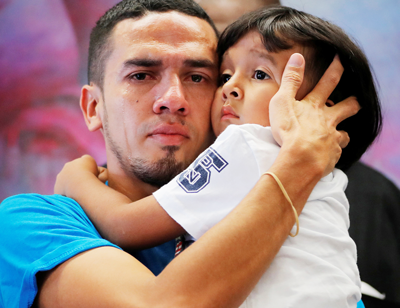My dear brothers and sisters in the Lord,
The issue of immigration reform has caught the attention of our country because of the unfortunate practice of separating children from their parents as they approach the border. Some of the people are seeking asylum or a safe haven escaping difficult situations in their home countries, especially violence and oppression. Others come seeking to improve their economic condition fleeing a life of poverty.
The practice of separating children from parents is a result of an internal directive from a past administration, which was not enforced. This present administration decided that this regulation could be used as a deterrent. A court order has compelled the Administration to reunite the families, although some parents have been deported without their children, who remain in U.S. custody. Catholic Charities organizations around the country, at their own expense, have volunteered to act as intermediaries to facilitate the reunions.
Earlier this year in his State of the Union speech, the President announced four pillars that he saw as the necessary elements for immigration reform.

First, there should be a path to citizenship for those commonly known as DREAMERS, who were brought as minors to this country by their parents without proper immigration status. Proposed bills in the House of Representatives deal only with those who have received DACA (Deferred Action for Childhood Arrivals). This is only about half of the 1.8 million children in this category. Unfortunately, both bills have languished in Congress and will only affect the DACA recipients. The legislation will not give these people an opportunity, as was promised in earlier proposed legislation, to be able to petition for their undocumented parents and siblings. Certainly, no action will be taken, if any, until after the mid-term elections.
Second, border security is a top priority, which is the right of every nation as the Church has already said. However, spending 25 billion dollars on a wall, even if it is paid over ten years, is an unnecessary step. More sophisticated methods of preventing illegal entry, which are less costly, can be used. The real problem is protecting the workplace for American workers or authorized alien workers. An enforcement of programs, such as the use of the E-Verify program to verify Social Security Numbers or some other similar program, coupled with the legalization of the workers already in the workplace, is the only humanitarian and sensible way to protect our country from illegal entry. Our now low unemployment rate has reinforced the need for more workers for open jobs.
Third, the President requested an end to the Diversity Immigrant Visa Program, which was originally enacted over 20 years ago to serve under-represented countries. In fact, the law has accomplished its purpose. Many countries, which were not represented, are now represented in the United States, and, if the present law does not change, will continue to be represented. The regions of Africa and Asia, at present, have benefited from this category. Unfortunately, there are only 50,000 visas per year, which would be allocated to other categories, cutting almost in half the annual entry of immigrants to our country. In most years, the U.S. has accepted over 900,000 legal immigrants.
Finally, the President wanted to restrict family-based immigration, unfortunately given the name of “chain migration.” This approach asserts that through family-related immigration we are not receiving the kinds of workers who contribute to our country’s need for more skilled workers. However, this can be misleading because the fact is that more than half of the legal entrants have college-level degrees.
Again, unfortunately, there is a misunderstanding of how immigrants are integrated into our country. It is family members here who meet them at the ports of entry, who find them places of residence and find them their first jobs. There is no government agency that accomplishes this function. Rather, it is only families that have continually built America from its very beginning, and not the immigration system. Also, by undercutting the family immigration system, we may leave more than 3 million people out who have patiently waited in line for years for legal immigration. They will lose their petitions, if their priority dates are not current, in just a few years after the new law enactment.
Clearly, the proposed bills will not have accomplished most of the purposes behind these four pillars. It is unfortunate that we cannot come together as a nation and truly understand the problem and opportunity that immigration presents to us and come to a bi-partisan and intelligent solution to the immigration conundrum.
I have put out into the deep long ago in relation to understanding U.S. immigration policy, which is, unfortunately, largely influenced by a basic misunderstanding of the impact of immigration. Again, the media, in its search for headlines, does little to explain the real situation. As Labor Day is just a month away, consider the plight of the undocumented workers in our midst and the contribution they make to our great Nation.
